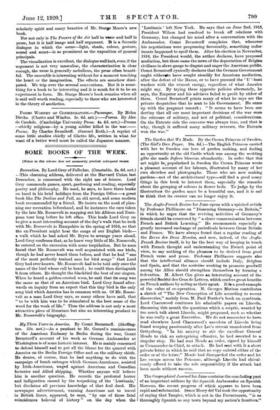My Three Years in America. By Count Ben:eater& (Skeffing- ton.
25s. net.)—As a pendant to Mr. Gerard's reminiscences of the American Embassy in Berlin during the war, Count Bernstorff's account of his work as German Ambassador at Washington is of some historic interest. He is mainly concerned to defend himself and to put all the blame for the quarrel with America on the Berlin Foreign Office and on the military chiefs. He denies, of course, that he had anything to do with the campaign of bomb outrages which German-Americans, assisted by Irish-Americans, waged against American and Canadian factories and Allied shipping. Whether anyone will believe him is another question. He records the profound horror and indignation caused by the torpedoing of the Lesitania,' but disclaims all previous knowledge of that foul deed. His newspaper advertisement, warning Americans not to travel in British liners, appeared, he says, " by one of those fatal coincidences beloved of history " on the day when the
Lusitania ' left New York. He says that on June 2nd, 1915, President Wilson had resolved to break off relations with Germany, but changed his mind after a conversation with the Ambassador. Count Bernstorff complains that, whenever his negotiations were progressing favourably, something unfor- tunate happened to spoil them. After his election in November, 1916, the President would, the author declares, have proposed mediation, but there came the news of the deportation of Belgian civilians in slave-gangs to disgust and anger the American public. Count Bernstorff cynically declares that the German Government ought eithereto have sought steadily for American mediation, after the defeat of the Marne, or to have pursued the ' U '-boat warfare with the utmost energy, regardless of what America might say. By trying these opposite policies alternately, he says, the Emperor and his advisers failed to profit by either of them. Count Bernstorff prints many of what he says are the private despatches that he sent to his Government. He gems up with the pregnant remark : " It seems to have been our destiny that all our most important decisions of the war were the outcome of military, and not of political, considerations. On the Entente side the converse was always true, and that is why, though it suffered many military reverses, the Entente won the war."






































 Previous page
Previous page